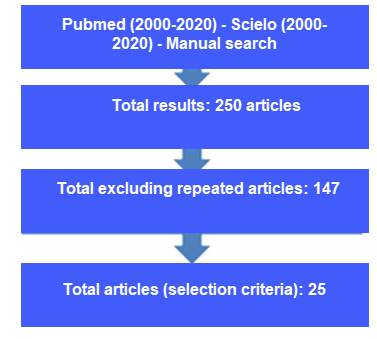Resumo
Objetivo: describir los resultados que se obtienen con el uso de ortopedia prequirúrgica NAM, Dynacleft y componente nasal en relación a estética, alimentación y brecha entre segmentos maxilares.
Método: Se realizó un análisis de la literatura publicada utilizando bases de datos Pubmed y SCIELO, además de una búsqueda manual de libros y artículos científicos. Después de aplicar los criterios de inclusión y exclusión, se analizaron 25 estudios.
Resultados: La literatura indica que NAM y Dynacleft mejoran la estética y disminuyen la brecha entre los segmentos maxilares, con respecto a la alimentación se necesita mayor evidencia.
Conclusión: los resultados obtenidos con la ortopedia prequiríurgica son mejores si se empieza los primeros días de nacimiento. Dentro de la estética destaca la simetría labial y nasal, proyección de la punta de la nariz y cicatriz post operación primaria.
Referências
2.Nazer J, Cifuentes L. Prevalencia al nacimiento de malformaciones congénitas en las maternidades chilenas participantes en la ECLAMC en el periodo 2001-2010. Rev Med Chile. 2014;142(9):1150-1156.
3.Hechenleitner T, Monasterio L, Lopes Y, Tastets ME, García J, Valderrama F. Tratamiento ortopédico pre-quirúrgico Dynacleft y Conformador Nasal en pacientes con fisura labio palatina unilateral complete tratados en Fundación Gantz, Santiago, Chile. Rev. Ateneo Argent. Odontol. 2014; 52(1):17-24.
4.Ford A. Tratamiento actual de las fisuras labio palatinas. Rev Med Clin Condes. 2004;15 (1): 3-11.
5.Zhang JX, Arneja JS. Evidence-Based Medicine: The Bilateral Cleft Lip Repair. Plast Reconstr Surg 2017;140 (1): 152e-165e.
en niños fisurados. Reporte de caso clínico. Odontoestomatología.2015; 17(25):53-59.
7. Chile. Ministerio de Salud. Guía Clínica: Fisura labiopalatina. Anexo 8: Ortopedia prequirúrgica. Santiago: Minsal; 2009.
8.Attiguppe PR, Karuna YM, Yavagal C, Naik SV, Deepak BM, Maganti R, Krishna CG. Presurgical nasoalveolar molding: A boon facilitate the surgical repair in infants whit cleft lip and palate. Contemp Clin Dent. 2016; 7(4):569-573.
9. Chile. Ministerio de salud. Guía Clínica Auge: Fisura labiopalatina. 3ra edición. 3.1: Pervención primaria. Pregunta clínica 15. Santiago; Minsal: 2015.
10.Prahl-Andersen B. Dental Treatment of Predental and Infant whit Clefts and Craniofacial Anomalies. Cleft Palate Craniofac. J. 2000; 37(6):528-532.
11.Grayson B, Sheye P. Presurgical nasoalveolar moulding treatment in cleft lip and palate patients. Indian J Plast Surg. 2009; 42(1):56-61. [Fecha de acceso: 25 de marzo de 2020]. Disponible en: https://pubmed.ncbi.nlm.nih.gov/19884682/
12.Shetye, PR. Update on treatment of patients with cleft—Timing of orthodontics and surgery. Semin Orthod. 2016; 22(1): 45–51.
13.Santiago PE, Grayson BH. Role of the craniofacial orthodontist on the craniofacial and cleft lip and palate team. Semin Orthod. 2009; 15(4): 225-43.
14.Monasterio L, Ford A, Gutierrez C, Tastets M, García J. Comparative Study of Nasoalveolar Molding methods: Nasal Elevator Plus Dynacleftt Versus NAM-Grayson in Patients Whit Complete Unilateral Cleft Lip and Palate. Cleft Palate Craniofac. J. 2013; 50(5):548-554.
15.Avhad R, Sar R, Tembhurne J. Presurgical management of unilateral cleft lip and palate in a neonate: a clinical report. J Prosthet Dent. 2014; 112(3):676-679.
16.Alperovich M, Frey JD, Shetye PR, Grayson BH, Vyas RM. Breast Milk Feeding Rates in Patients with Cleft Lip and Palate at a North American Craniofacial Center. Cleft Palate Craniofac. J. 2017, 54(3), 334–337.
17.Nazarian Mobin S, Karatsonyi A, Vidar E, Gamer S, Groper J, Hammoudeh JA, Urata M. Is Presurgical Nasoalveolar Molding Therapy More Effective in Unilateral or Bilateral Cleft Lip–Cleft Palate Patients? Plast Reconstr Surg 2011; 127(3): 1263–1269.
18.Broder H, Flores R, Clouston S, Kirschner R, Garfinkle J, Sischo L & Phillips C. Surgeon’s and Caregivers’ Appraisals of Primary Cleft Lip Treatment with and without Nasoalveolar Molding: A Prospective Multicenter Pilot Study. Plast Reconstr Surg 2016;137(3); 938 - 945.
19.Kamble V, Parkhedkar R, Sarin S, Patil P, Kothari B. Simplifying cleft surgery by presurgical nasoalveolar molding (PNAM) for infant born with unilateral cleft lip, alveolus, and palate: a clinical report. J. Prosthodont. Res. 2013;57(3):224-231
20.Patel PA, Rubin MS, Clouston S, Lalezaradeh F, Brecht LE, Cutting CB, Shetye PR, Warren SM, Grayson BH. Comparative Study of Early Secondary Nasal Revisions and Costs in Patients with Clefts Treated with and without Nasoalveolar Molding. J. Craniofac. Surg. 2015. 26(4):1229-1233.
21.Ahmed M, Ahsanuddin S, Retrouvey JM, Koka K, Qureshi H, Taub P. Fabrication of nasoalveolar molding devices for the treatment of cleft lip and palate, using stereolithography additive manufacturing processes and computer - aided design manipulation software. J Craniofac. Surg 2019; 30(8): 2604-2608.
22.Gomez V, Lopez-Garco J, Magía Gago A, Nieto I, Aneiros L. Protocolo ortopédico-ortodóncico de actuación en pacientes con fisura labio-alveolar y palatina. Odontología Pediátrica. 2017;25(3):173-190.
23.Ritschl LM, Rau A, Güll FD, DIBora B, Wolff K, Schönberger M, Bauer F, Wintermantel E, Loeffelbein D. Pitfalls and solutions in virtual design of nasoalveolar molding plates by using CAD/CAM technology- a peeliminary clinical study. J Craniomaxillofac Surg. 2016; 44(4): 453-459.
24.Shen C, Yao CA, Magee W, Chai G, Zhang Y (2015). Presurgical Nasoalveolar Molding for Cleft Lip and Palate: The application of digitally designed molds. Plast Reconstr Surg 2015; 135(6): 1007e–1015e
25.Gong X, Damg R, Xu T, Yu Q & Zheng J. Full digital workflow of nasoalveolar molding treatment in infants with cleft lip and palate. J Craniofac Surg. 2020; 31(2), 367-371.


